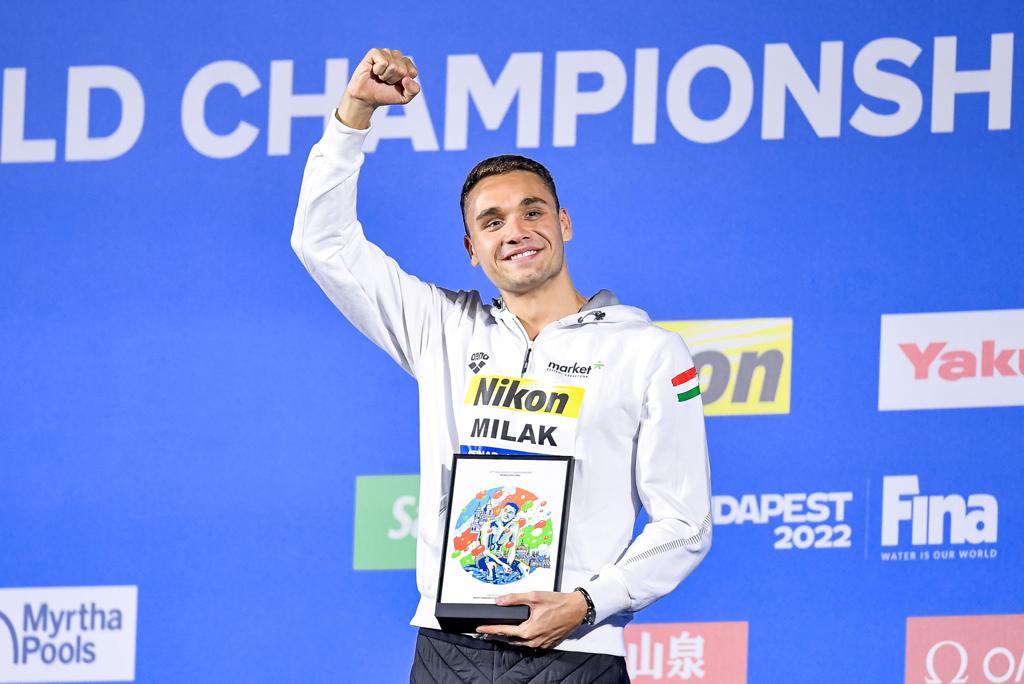This article originally appeared in the Spring 2023 issue of SwimSwam magazine. Subscribe here.
After breaking the World Record in the 100 back and 200 fly during XIX World Championships in Budapest, Thomas Ceccon and Kristof Milak received custom-minted non-fungible tokens (NFTs) created by local artist Krizbo that represented the athletes immediately after their races. This was the first time NFTs and swimming got together, and we don’t know if something similar is planned for future international competitions. But in other sports, NFTs are something real that involves money and new jobs. So, what is the link between NFTs and sports? Can swimming use it differently?
Sports NFTs are blockchain-based digital assets that are verifiably one-of-a-kind and are used to represent digital trading cards, sporting events, and digital memorabilia. The use of sports NFTs gives athletes, teams, and sports brands a new method for monetization.
Lots of fans, especially in team sports, are ready to spend a lot of money to acquire limited-edition virtual memorabilia of their favorite player or team. For example, a tokenized, unprocessed photo of LeBron James sold for $35 million, which grants its owner exclusive rights. Another sports NFT that sold for millions is the MLB Champions Brett Gardner NFT, an NFT commemorating the New York Yankees star, which sold for $21.2 million.
The use of NFTs is intended to create new kinds of interactions between fans and clubs. Virtual collectibles or player cards enable fans to get together, even if not in person, and trade stickers featuring special highlights from their favorite stars. These cards can have a price tag of $1,000.
NFTs are also being used to create digital experiences for fans. For example, the NBA has launched a series of NFTs allowing fans to purchase virtual courtside game seats. These types of NFTs can be used to access exclusive content, such as interviews with players, behind-the-scenes footage, and other experiences you can’t usually do with a regular ticket.
NFTs transform the idea of sports memorabilia by enabling people to own the cards of their favorite players and even game videos. NFTs have also changed the way some sports organizations interact with their fans.
Sports teams may receive additional income if they issue NFTs. Traditionally, the primary sources of revenue for a sports business have been ticket and merchandise sales, media rights, and sponsorships. Even in the midst of a pandemic, teams can use NFTs to tokenize game tickets, stream live games to token holders, or plan holder-only events in the metaverse.
Finally, many teams and operations are finding clever uses of sports NFTs in building a fan membership program. Think of them as combining the virtual experiences mentioned here with old-school fan experiences. In this case NFTs are being used as access passes to hyper-exclusive offerings: stadium access, members-only events, or training camp access.
The Dallas Mavericks, for example, offer a free NFT to every fan with a home game ticket — and also an account with the team. This means that every fan who redeems their free NFT will have to provide the team with contact information that can then be used for marketing and other activities. Those NFTs can be traded or sold by the fans, with the smart contract providing that same type of information to the team’s marketing office.
Can you imagine buying and collecting virtual swimmer memorabilia like Ian Thorpe’s raw photo or an NFT commemorating Michael Phelps’ Olympic medal record? Thanks to NFTs, maybe we’ll be looking at the next World Cup from another point of view — right behind the starting block while sitting comfortably on the sofa at home.
Around the web, you can find some private teams or clubs who tried to enter this special market, but swimming will reach NBA, MLB and the other big leagues only if big organizations like World Aquatics decide to embrace this opportunity.
The most expensive NFTs in sports (as of December 2022):
- Statue of LeBron — $35 million
- MLB Champions Brett Gardner — $21.28 million
- Jermall Charlo Lions Only GOLD ULTIMATE — $19.1 million
- Michael Jordan SportPunk — $5.06 million
- Rare Diego Maradona 2020-21 — $4.3 million
Source: coingape.com

I’ll take my million dollars instead of a jpeg of a monkey.
Yeah uh, notice that “as of December 2022″…
There’s probably going to eventually end up being some practical uses for blockchains, but the massive speculative bubble that grew during the pandemic burst. Those NFTs you listed cannot be sold for that value on the market today. NFTs aren’t cool to the lowest common denominator bros anymore, it looks cringy and out of touch.
This was always my take on NFTs. I appreciate the fintechbros for their donations to help develop blockchain tech via NFTs, and I agree that blockchain has a lot of uses, but NFTs are currency or commodity was never going to stick. At least not until some way future date where people are more perpetually-online.
The bubble was inflated by the fact that hackers and a few very loud voices were constantly talking about NFTs. The market wasn’t anywhere near enough of the population to sustain that, and unlike AMC or Gamestop, there was no “next move” to use the bubble to solidify the position.
No no no no no.
We all need to stop trying to make NFTs a thing.
My Donald Trump NFT trading card and I disagree with you.